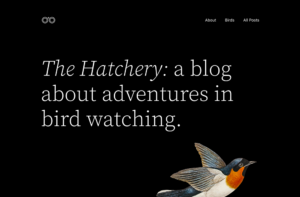Today we are pleased to introduce one of the most creative visual communications designer, rockstar at saying stuff, WordPress expert and WordCamp organizer – Michelle Schulp. Enjoy the interview on this incredible woman’s work, lifestyle and guiding motivation.
It’s a huge pleasure to interview you, Michelle. Thanks for agreeing. In your presentations, you quite often encourage to “stop making things pretty and start designing”. So why does it happen that the most beautiful sites are not always the most successful ones?
No site will be successful if it doesn’t understand its audience, regardless of how attractive it is. If the people visiting can do what they set out to do, that’s the most important thing. Being consistent with your brand is also important, but that’s second to user experience. Pushing the envelope, doing things a crazy new way, or trying to be different is fine, if that’s what your audience wants or expects, but this all explains why some really ugly/boring sites (aesthetically) are actually pretty successful.
You’ve mentioned that designers and developers speak different languages: while the first are fluent in How, the second manage the Whys. It’s clear that both are extremely important for a project, but this difference often leads to communication breakdowns. How do you solve it?
Mostly just by continuing to ask questions. Treating the other people on your team, whether they are designers, writers, marketers, developers, etc. as valued team members and knowledgeable experts in their field goes a long way to bridging those gaps.
Once you’ve said that “Web design is like jazz”. What could you compare WordPress with?
Well I’m sure Matt Mullenweg would always appreciate a comparison to jazz 🙂
What do you like most about WordCamps? What would you say to convince someone to attend it?
I like a lot of things about WordCamps: the knowledge being shared, the enthusiasm, the passion of the volunteers, the way it brings together a local community… but I think my favorite part is that everyone who is attending is equally accessible. This is pretty different from most conferences where the speakers and VIPs are often only around just when they are on stage, and not available to the audience. At WordCamps, yes some people already know others, have friends or in-groups or “fame” within the community, but regardless of how new or experienced you are, they’re always available to hang out, answer questions, or just talk. I’ve met some of my now closest friends (and my significant other) at WordCamps.
You’ve been blogging with WP for more than 6 years already. Why did you decide to switch from building sites for yourself to doing it for others? What makes you use this platform? Have you ever tried any alternatives?
I wouldn’t say blogging for that long, my blogs are extremely sporadic. And actually, I built websites for other people (using WordPress) before I ever built one for myself! I started years ago just because I heard that “WordPress was easy for designers” and kept going because the community support was so great. I’ve used other CMSs at prior jobs or just out of curiosity, but because I’m the type of person who prefers to specialize, I’ve embraced WordPress as my primary offering for web design.
Are there any WP projects that you have worked on and are mostly proud of? What are the top 3 WP based sites embodying your design idea?
I have a couple really cool ones that I’m working on right now, including a custom ecommerce build, but they’re not quite launched yet. A recent one I just built is http://www.smartermpls.com, during which I collaborated with a design agency that was rebranding, and I did all the custom development for it, which was great because I got to learn a whole bunch of JavaScript. I’ve also enjoyed working with the folks at http://bexleyeducationfoundation.org and am currently doing a Phase 2 with them (so stay tuned!) because it was my first major project working with custom meta fields and really focusing on the admin experience of content management.
When you face WP issues, where do you turn to? Are there any resources you follow?
When I can’t figure something out by Googling it or checking the codex, I’ve got a large network of WordPress friends (met through WordCamps and meetups) that I can reach out to. There are numerous Slack channels (including WordPress Core Slack, open to everyone) plus Twitter and Facebook. It doesn’t hurt that I live with a smart WordPress developer either 🙂
What are your must-have WordPress plugins? Why they’re your favorite? What makes them necessary for you?
I have a suite of plugins I install on most client sites (like Gravity Forms, Advanced Custom Fields, and BackupBuddy) as well as go-to plugins for more specific functionality (like The Events Calendar and WooCommerce), and I also swear by DesktopServer for my local development environment.
What do you think about the automated method of website migration? Do you have any experience with online converters?
The closest I’ve come to automated migration is just backups and imports via a few of the major plugins out there. Seems like a valuable service though, especially for people that don’t want to fiddle with creating databases, etc.
As far as we know, you’ve been playing flute and piccolo through childhood, high school, and college and you were in the marching band. The most important question is not how but why. What made you choose design as the dominant work for living? Why not music?
I think I just felt like I could do design for a living without hating it, but I wouldn’t be able to do the same with music. Some things fit better as hobbies, and others can be pursued as a career.
P.S. Left with a strong desire to switch to WordPress? Consider aisite automated migration service to perform the conversion as easy and convenient as possible. Find more detailed information here and try your Demo Migration with no delay.










